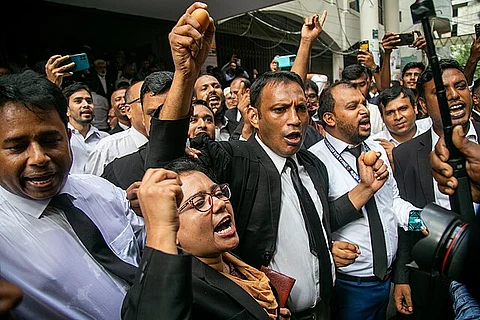

Former Election Commission chief KM Nurul Huda was remanded to custody for four days on Monday following a violent mob assault. The 77-year-old faces allegations of rigging past elections in favor of ousted Prime Minister Sheikh Hasina, who was deposed during mass protests in August 2024. Huda’s detention follows a formal case filed by the Bangladesh Nationalist Party (BNP), accusing him and other commissioners of electoral fraud that cemented Hasina’s 15-year autocratic rule.
On Sunday, protesters stormed Huda’s Dhaka residence, dragging him into the street where they placed a garland of shoes around his neck and beat him severely before handing him to police. Officers later escorted him to court wearing a protective helmet amid safety concerns. The interim government condemned the attack, stating, "Swooping on an accused and physically assaulting him is illegal and contrary to the rule of law," while human rights group Ain O Salish Kendra denounced it as a "complete violation of due process."
Interim leader Muhammad Yunus affirmed elections will occur by April 2026—Bangladesh’s first vote since Hasina’s ouster. His administration warns that political infighting threatens democratic reforms, emphasizing the extended timeline allows for institutional restructuring. Hasina, now 77 and living in self-exile in India, faces an ongoing trial in absentia for alleged crimes against humanity. Her government had been widely criticized for human rights abuses, politicized courts, and civil service manipulation.
The case against Huda underscores deep societal divisions following decades of contested elections. While public anger over electoral manipulation remains palpable, authorities urge citizens to avoid vigilantism. Yunus’s government has prioritized rebuilding judicial independence and depoliticizing electoral oversight ahead of the 2026 polls.